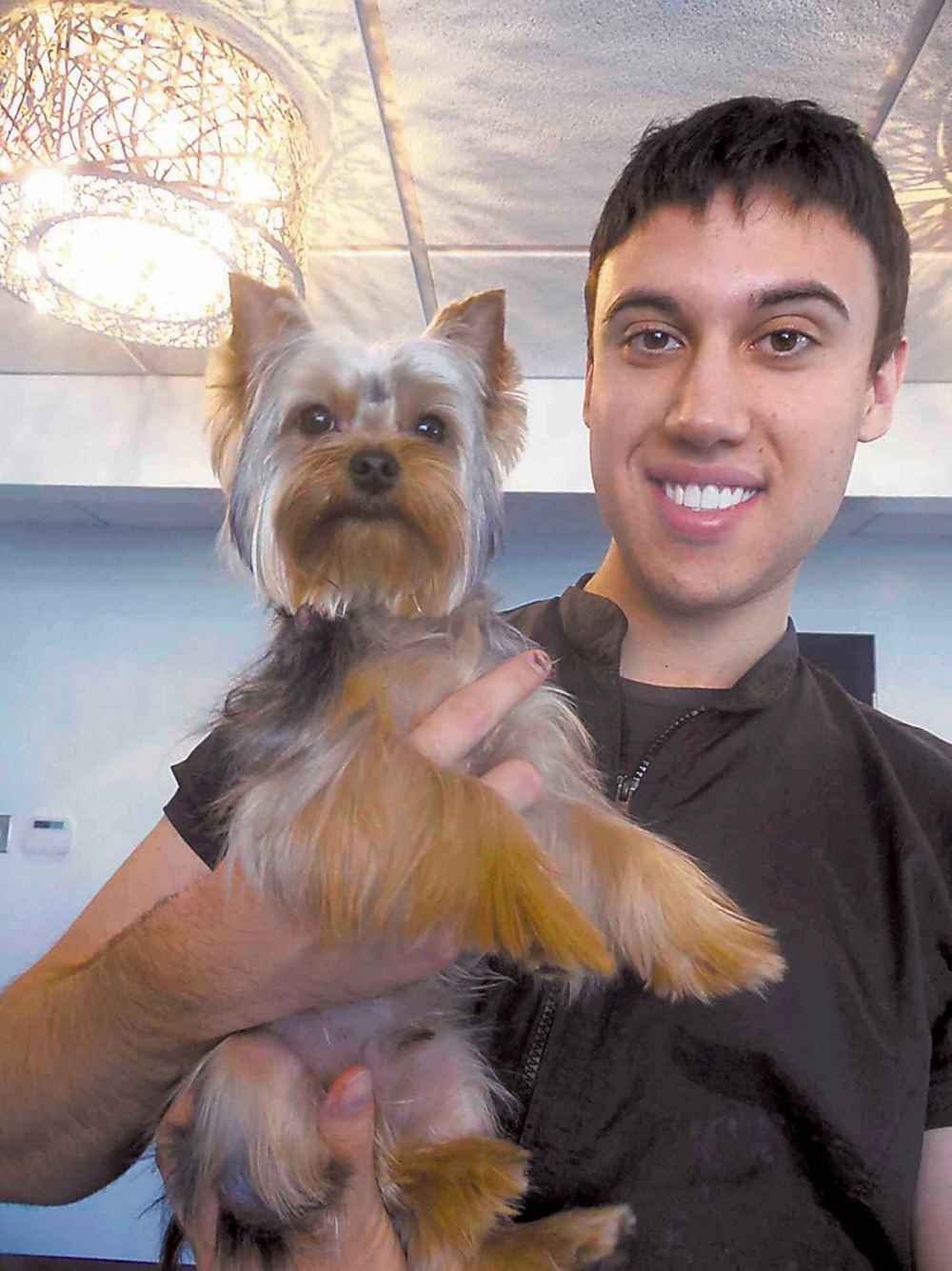Horrified, harassed and helpless Traumatized White Lotus Pet Spa employees say they came up empty when seeking assistance from human rights commission, provincial authorities
Read this article for free:
or
Already have an account? Log in here »
To continue reading, please subscribe:
Monthly Digital Subscription
$0 for the first 4 weeks*
- Enjoy unlimited reading on winnipegfreepress.com
- Read the E-Edition, our digital replica newspaper
- Access News Break, our award-winning app
- Play interactive puzzles
*No charge for 4 weeks then price increases to the regular rate of $19.00 plus GST every four weeks. Offer available to new and qualified returning subscribers only. Cancel any time.
Monthly Digital Subscription
$4.75/week*
- Enjoy unlimited reading on winnipegfreepress.com
- Read the E-Edition, our digital replica newspaper
- Access News Break, our award-winning app
- Play interactive puzzles
*Billed as $19 plus GST every four weeks. Cancel any time.
To continue reading, please subscribe:
Add Free Press access to your Brandon Sun subscription for only an additional
$1 for the first 4 weeks*
*Your next subscription payment will increase by $1.00 and you will be charged $16.99 plus GST for four weeks. After four weeks, your payment will increase to $23.99 plus GST every four weeks.
Read unlimited articles for free today:
or
Already have an account? Log in here »
Hey there, time traveller!
This article was published 11/07/2019 (2343 days ago), so information in it may no longer be current.
They are supposed to be places you can turn to when things in the workplace turn ugly — the Manitoba Human Rights Commission, the provincial employment standards and workplace safety branches, the courts.
But when employees at White Lotus Pet Spa sought help from those agencies after witnessing what they called repeated incidents of abusive and troubling behaviour at their workplace, they found little support in response.

Aneke Mendarozqueta began witnessing abuse not long after she started working at White Lotus in 2014.
Over the eight months she worked there, including as a general manager, Mendarozqueta says she witnessed a steady stream of “traumatizing” emotional and psychological abuse from owner Patrick Maxwell, including near-constant harassment of staff and even rough treatment of animals.
In early 2015, Mendarozqueta and two other staff members met privately to discuss taking action. They decided that one of them would contact the province’s employment standards branch, while Mendarozqueta would reach out to the Human Rights Commission and a third employee would go to the media.

These attempted complaints went nowhere. When Mendarozqueta met with the human rights commission, she recalls, she was told the type of harassment they were reporting did not fall within its jurisdiction, which concerns discrimination covered by the Human Rights Code.
The employment standards complaint similarly fizzled out.
“It was about a month or so of us trying to push things forward, and every single one of us that reached out was met with no interest in helping us,” Mendarozqueta says. “There’s very, very little support and very little protection for employees, particularly for employees who are being abused psychologically.”
Over the years, other employees attempted to speak out about the abuse they say they suffered at White Lotus.
The Free Press has now spoken to more than a dozen former staff members, including some who worked at the Osborne Village business shortly after it opened in 2013. At least five of them attempted to alert some sort of authority to the issues they were experiencing, including harassment and unpaid wages.
A provincial spokesperson confirmed Thursday that employment standards received six complaints against White Lotus, beginning in 2013, related to wages. In the same timeframe, workplace safety and health received three complaints, two of which were related to harassment and one related to concerns with equipment safety.

Yet little changed until the pet spa suddenly closed June 27, after the Law Society of Manitoba opened an investigation into Maxwell’s now-former romantic partner, lawyer and former Manitoba Liberal party president Paul Hesse, for allegedly referring his immigration clients to invest in businesses linked to Maxwell.
Hesse and Maxwell have not returned Free Press requests for comment this week.
The fact that the alleged harassment went on for so long, and attempts to find remedies went nowhere, highlights how toothless worker protections in Manitoba can be, University of Manitoba labour professor David Camfield says.
“Although it’s an extreme case, it’s kind of a microcosm in an intensified form of things that happen all over the place, in especially non-unionized workplaces,” Camfield said. “There are so many workplaces where employers do these kind of things, even if it’s not usually to the same extent. And people have very little recourse besides quitting.
“I think lots of workers, not just young workers, don’t know where do you turn in these kind of situations,” Camfield continued. “The legal rights are weak, and the processes are inadequate, and most people don’t even know about those. In terms of independent advocacy, there’s very little.”
Under Manitoba workplace health and safety laws, every employer must have an anti-harassment policy. But the wording of the law is vague about what workers can do when the harassment comes from their boss, Camfield said, and even when employees do reach out for help, enforcement options are limited.
“There are so many workplaces where employers do these kind of things, even if it’s not usually to the same extent. And people have very little recourse besides quitting.”– University of Manitoba labour professor David Camfield
The province’s Workplace Health and Safety branch is responsible for enforcing the laws under which workplace harassment falls, Camfield said, but it is largely focused on matters related to physical safety. There is also an independent advocacy group in Winnipeg, the Workers Organizing Resource Centre.
Beyond that, Camfield said, many people looking for support will have difficulty finding out where to turn.
Province received complaints
A statement emailed to the Free Press Thursday from a provincial spokesperson:
Employment Standards received six complaints against White Lotus Pet Spa Ltd. from 2013 to present related to wages.
A statement emailed to the Free Press Thursday from a provincial spokesperson:
Employment Standards received six complaints against White Lotus Pet Spa Ltd. from 2013 to present related to wages. In the same timeframe, Workplace Safety and Health (WSH) received three complaints, two related to harassment and one related to concerns with equipment safety.
Anyone who feels they have been subjected to harassment and is uncomfortable with the systems in place at their workplace can contact WSH and/or the Manitoba Human Rights Commission. These agencies will follow up to ensure fair and timely investigations are conducted and appropriate actions taken without unlawful retribution against the worker.
It is important for workers to be able to raise safety and health issues in the workplace without fear of retaliation or reprisal. In recognition of this, Manitoba has laws in place that make it illegal to punish someone for raising a safety and health concern in good faith.
WSH will conduct investigations into allegations of reprisals for raising safety and health issues. If it is determined that a person was punished for raising a safety and health issue, WSH can order remedial action depending on the circumstances.
Remedies may include ordering back-pay and removal of reprimand documents from personnel files and reinstatement.
As the regulatory body for issues such as pay, breaks, overtime and wages in lieu of notice, Employment Standards has the ability to initiate investigations outside of the complaint process.
“There’s all this stuff on paper, and then there’s this reality of, what is the culture?” Camfield said. “What are the norms? What do people feel they have to put up with, versus what’s unacceptable? People feel that they don’t have a lot of alternatives, and in most cases, there isn’t much help.”
Without any help, the abuse White Lotus workers witnessed continued, former staff members said.
Maxwell would “go on little rampages” about staff to each other, one former worker said. In 2015, after telling some staff the spa was on the verge of bankruptcy, he pressured one 20-year-old staff member to ask her parents to invest in the business, she said, and verbally attacked her when she declined.
Mendarozqueta described one particularly disturbing incident she witnessed: Maxwell was grooming a cat when the animal lashed out and scratched him, she said. She described watching as Maxwell forcibly held the cat down against the grooming table and choked it until it almost lost consciousness.
After Maxwell stormed out of the room, Mendarozqueta and another staff member rushed to soothe the terrified animal. The other staff member who witnessed the incident confirmed Mendarozqueta’s description of the event.
“Honestly, I think I was just in shock,” the ex-worker said. “I was just terrified for the cat. That was probably one of the worst things I’ve seen from him, but he definitely did things like that. That wasn’t rare, wasn’t out of character for him.”
“Looking back, there are so many instances where I wish I could have had the strength to go in and support my co-workers, but he just gets into your head. You go into work terrified every day, and just hoping it wouldn’t be you. You begin to believe that you actually are worthless. You begin to believe that nobody’s coming for you.”– Aneke Mendarozqueta
Other incidents made staff terrified to speak out, they said, for fear of legal action. Several former workers report hearing Maxwell brag about being able to get Hesse to make legal threats for him. He has sued former employees, including once with Hesse acting as his lawyer.
“As soon as I was out, I was just terrified of what he was going to do to me,” one former staff member said. “I’m still scared of him and that was five years ago. He really knows how to make people scared to speak up. If you’re young, you can’t afford a lawyer for lawsuit after lawsuit after lawsuit.”
Beyond legal threats, many employees were scared to speak out for fear of ongoing harassment, they said.
Two former staff members told the Free Press that Maxwell tried to interfere with their employment after they left the spa. Months after Anna Smith was fired in 2014, she booked a modelling job for a local clothing designer. Maxwell approached the designer, she said, offering to pay them $1,000 to fire Smith.
The designer confirmed this account to the Free Press, and vividly recalled witnessing Smith’s distress.
For years, Maxwell used Smith’s image in the ubiquitous bus bench ads White Lotus bought throughout the city. As Maxwell owned the rights to the photo, which showed Smith holding a dog, there was little she could do to stop herself from becoming the face of White Lotus, she said, even as she lived in fear of her former boss.
“I knew that he could destroy my life in a second,” Smith said, adding that she hopes speaking out will clear her name. “Now I just feel worse that my pictures were still being used. I didn’t want to be affiliated.”
In early 2015, one staff member quit after witnessing how Maxwell had treated another employee. A few days after she gave her two-weeks notice, Maxwell cornered her in a back room and began berating her.
From the spa’s front desk, Mendarozqueta said she could hear the employee begging Maxwell to leave her alone, and give her space. The worker’s mother, who was listening to the incident on the phone, called 911. After hearing about the emergency call, the worker said, Maxwell finally let her leave the building.
When the woman later contacted the spa to ask about her last paycheque, Maxwell sent her a long message — seen by the Free Press — calling her a “common slut,” a “useless parasite” and “human excrement and filth.” He attached a photo of her that he had taken while she had been cowering, visibly terrified, in a corner.
The woman tried to obtain a restraining order against Maxwell and file a human rights complaint.
“To no avail,” the woman wrote, in an email to the Free Press. “They pretty much make you jump through hoops to file a (human rights) claim and if you get through all of that, with one claim they said most likely nothing will happen.”
About a year after she left, Maxwell contacted the woman’s new boyfriend and sent him insulting messages about her, she said. The boyfriend eventually hired a lawyer who sent Maxwell a cease and desist letter.
These incidents and others were part of what enabled the alleged abuse to continue for so long, staff said.
“Looking back, there are so many instances where I wish I could have had the strength to go in and support my co-workers, but he just gets into your head,” Mendarozqueta said. “You go into work terrified every day, and just hoping it wouldn’t be you.
“You begin to believe that you actually are worthless. You begin to believe that nobody’s coming for you.”
Meanwhile, as many as 10 former White Lotus staff, who were working at the spa at the time of its closure on June 27, have yet to receive their final paycheques. Managers have stopped returning their messages, and they fear they will never be paid for the hours that they worked.
At least one recent employee has filed an employment standards claim for the missing wages.
melissa.martin@freepress.mb.ca
Our newsroom depends on a growing audience of readers to power our journalism. If you are not a paid reader, please consider becoming a subscriber.
Our newsroom depends on its audience of readers to power our journalism. Thank you for your support.















